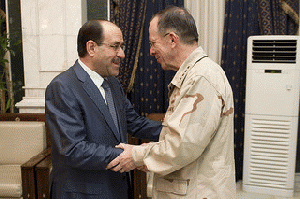| Back OpEd News | |||||||
|
Original Content at https://www.opednews.com/articles/The-American-Legacy-in-Ira-by-Dave-Lefcourt-130509-924.html (Note: You can view every article as one long page if you sign up as an Advocate Member, or higher). |
|||||||
May 9, 2013
The American Legacy in Iraq
By Dave Lefcourt
Sunni-Shiite bloodletting has increased dramatically in Iraq. Shiite Gov't security forces raided & killed 50 Sunni protesters near Kirkuk two weeks ago. Enraged Sunni's retaliated by bombings of Shiite areas & Shiite worship sites. Dashed Sunni hopes & unfulfilled Shiite gov't promises to them have created this chasm, part of the American legacy in Iraq. The sectarian civil war in 2006 may happen again.
::::::::

110801-N-TT977-346 President Nouri al Maliki of Iraq with former Chairman of the Joint Chiefs of Staff Admiral Mullen
(Image by Chairman of the Joint Chiefs of Staff) Details DMCA
110801-N-TT977-346 President Nouri al Maliki of Iraq with former Chairman of the Joint Chiefs of Staff Admiral Mullen by Chairman of the Joint Chiefs of Staff
President Nouri al Maliki of Iraq with former Chairman of the Joint Chiefs Admiral Mullen
It should come as no great surprise that sectarian violence has increased dramatically in Iraq.
Some background is in order. Sunni, Shiite bloodletting began during the U.S. occupation of Iraq, particularly during the sectarian civil war in 2006 abated only when Shiite ayatollah Muqtada al Sadr unilaterally withdrew his Mardi army from the fighting. Meanwhile the indigenous Iraqi Sunni's began rebelling against their former al Qaeda allies, who were indiscriminately killing Iraqi's including Sunni's, and thus began the indigenous Sunni "surge" against al Qaeda which American General Patraeus took advantage and usurped it as his own strategy.
But one needs to go back to the early days of the occupation to understand the current sectarian fissures in Iraq.
Paul Bremer was the head of the Bush authorized "Coalition Provisional Authority" (CPA). Bremer's first act was to disband the 400,000 man Iraqi army of mostly Sunni's, a disastrous decision instantly creating an insurgent force against the American occupation. Bremer also dismissed all civil servants (de-baathification) who had been members of Saddam Hussein's Baath Party (primarily Sunni's who were required to join the party in order to get the jobs) thus placing more Sunni's on the unemployment rolls.
Add in the U.S. push for early elections, all but guaranteeing a Shiite presidency with Shiite's being the majority of the Iraqi population and Sunni's felt further marginalized from a country they once ran under the reign of Saddam Hussein.
Moving ahead to today's current Sunni protests (which began in December), two weeks ago a Sunni protest camp near the city of Kirkuk was raided by Iraqi Shiite government security forces that left 50 people dead. Government security raids spread to other Sunni areas including Anbar Province that borders Syria and Jordan. These raids enraged the Sunni's which resulted in retaliatory car bombings in Shiite areas killing and wounding more than 40. Six others were killed in Shiite worship site south of Baghdad.
Then there's the Sunni led uprising and civil war in neighboring Syria. Iraqi Shiite President Nouri al Maliki has allowed Iranian arms to be transported across Iraq into Syria to support Bashar Assad's Alawite regime (a Shiite sect) against the Syrian opposition dominated by Sunni's. Iraq's Sunni's are known to be supportive of the Syrian rebels.
But at the heart of the current Sunni grievances are the anti-terrorism measures of laws and practices, first imposed by the U.S. in the early days of the occupation and now fully adopted by the Maliki government. Essentially these policies pay Iraqi informants (who once got paid by the American's) to provide information (much of it false) on other Iraqi citizens (mostly Sunni's) which often times puts innocent people in prison. Thousands of detainees languish in prison, sometimes for years without being charged.
When Sunni's protested to the government Maliki formed a committee to address these grievances and soon after began to announce a number of detainees were released. But critics of the government maintain that many said to be released are still in prison.
Another protest agreement agreed to by the government had former Sunni military officers who served in Saddam Hussein's army were promised the chance to return and regain their salaries and former positions. To date that promise has yet to be fulfilled.
Thus the sectarian divide between Iraq's Sunni's and Shiites has become a chasm of Sunni hopes and unfulfilled Shiite government promises which may bring another civil war. What we're witnessing in Syria may very well occur in Iraq. Only in Iraq it'll be part of the legacy left behind by the inept American occupation that helped create this sectarian divide.
Authors Website: dglefc22733@aol.com
Authors Bio:
Retired. The author of "DECEIT AND EXCESS IN AMERICA, HOW THE MONEYED INTERESTS HAVE STOLEN AMERICA AND HOW WE CAN GET IT BACK", Authorhouse, 2009